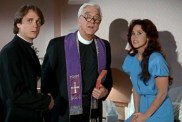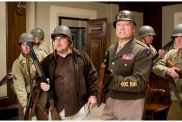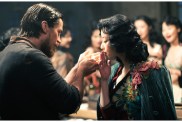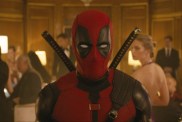Paul Verhoeven talks Elle, Total Recall, Jesus and more
Dutch filmmaker Paul Verhoeven had an incredible ten-year run in Hollywood from 1987’s classic RoboCop through Total Recall, Basic Instinct, Showgirls and 1997’s Starship Troopers. By the time he made 2001’s Hollow Man, he’d burnt out on making Hollywood product and went back to his native country to make the incredible Black Book in 2006.
Now he’s back with his latest thriller Elle, starring the incomparable Isabelle Huppert as a driven career woman dealing with the emotional fallout of being violently raped in her own home. It’s a hard-to-classify film that constantly upends expectations and maintains a surprising amount of levity and tenderness while dealing with the hot-button topic of sexual assault. It is also one of the best films of the year and a triumphant return-to-form from the director. The film opens in theaters November 11.
We had the chance to sit down with Verhoeven for an epic interview about Elle, Total Recall, his scrapped medieval epic Crusade and his long-in-development Jesus Christ biopic!
ComingSoon.net: I read somewhere that you storyboarded this movie. Did you use an artist or did you do it yourself?
Paul Verhoeven: I did it first myself, and then basically, but I sketched it more, and then I gave it—it’s all my movies. I did a lot myself and then I gave it to a storyboard artist, in this case. And in most cases, certainly in American filmmaking, always give it to the storyboard artist. Not with my Dutch movies, for example, with “Black Book,” I didn’t do it. I used my own drawings and gave that to the DP and whatever. And they were good enough because you can really see it. But I mean, to convince the actors and the actresses, especially with scenes that have to do with sexuality and stuff like that, it’s better to have a real artist so that they can really see, before we start shooting, but especially with sex scenes, that the actors and/or actresses are really precisely informed about what I’m going to do, let’s say when they’re naked or half-naked or whatever. I mean, you don’t want to have any discussion on the set, basically, about breasts and all that stuff. That has to be all sorted out before you shoot.
CS: Very technical.
Verhoeven: Technical, on the set it will be technical, but you will be following basically everybody, including me and the actors and actresses would follow the storyboards that we all have decided on, that we basically—are acceptable.

CS: This movie comes out at an interesting time, because I don’t think rape and sexual assault has ever been a bigger part of the national discussion.
Verhoeven: No, that’s clear. It’s happening in the last two weeks. The election cycle seems now to be, let’s say, dictated nearly by sexual revelations, isn’t it?
CS: Yeah.
Verhoeven: Yeah, it’s amazing, what’s happening here, yeah.
CS: It’s stunning. In “Elle” Isabelle’s character… Let’s say an interesting thing starts to happen — something you wouldn’t see in a Hollywood movie — where the line between attraction and assault starts to blur in her mind.
Verhoeven: Right.
CS: You definitely reveal that her attacker is a very sick man, but I want to know how you navigate blurring that line and what was too far and what was too little?
Verhoeven: First of all, there was a novel. This character was already created by Philippe Djian in the French novel. And I think we stuck to the character, basically. We stuck also to the structure of the book and stuff like that. Isabelle will certainly confirm that we never discussed these things. We never discussed really what it meant or what the psychology was, why she behaved, especially in her behavior in the third act, after she finds out who the rapist is, she makes a move basically. It’s a moment basically that she sits in the car, isn’t it?
CS: Yeah, in the car.
Verhoeven: She makes a decision that probably few people would make.
CS: To say the least.
Verhoeven: But this character, because it’s Isabelle, you believe that she does that, yeah. I think you would not follow her. And I think what should not be done is to relate this character to women in general. On the contrary, I think it is really an exceptional character. I don’t know if it even exists. I doubt it. I think it’s probably a construction, basically. I tried to find out last week if Philippe Djian had somebody in mind or not, but I didn’t get an answer from him yet because he was not available. But somebody in Holland asked me about it and said, “Well, it’s based on somebody that he knows?” And I said, “Well, I doubt it. I think he created that character.” But I don’t have that information, if it’s based on a certain kind of character. I think basically that Isabelle has called it a new kind of woman, although that still doesn’t explain completely why in the third act she goes into a sexual, sadomasochistic relationship. The movie, by purpose, doesn’t tell you how to fill that in. But of course, the information you have is not provided without necessity, I think, and it has to do probably with the development of her psychology, how she became this person, without trying to put it in a really convincing Freudian context, you know? We don’t do that.

CS: Obviously she’d experienced this very specific trauma when she was a kid, and like you said, it’s probably a trauma that very few, if any young girls experience at that age.
Verhoeven: Sure.
CS: And it left her with this sort of sense of detachment. The detachment is not shown to be sociopathic or psychopathic. It is her defense mechanism, not just against the rape, but against everything in her life.
Verhoeven: Against everything, basically. After what happened she has decided not ever to become a victim, and even if she’s a victim she wants to separate that from let’s say, this is this, and there is also that. The rape that happens is one element, but the situation with her mother is another element. They are all equally important. It is not that this rape colors everything else, you know? It’s compartmentalized, in fact. That’s how she did the acting. Strangely enough, in all the time that we worked together and prepared for the movie, we really didn’t talk about motivation. We didn’t talk about psychology. We didn’t say, “Is this the reason of why?” I mean, it felt like we all knew what we were talking about, but by talking about it, you would destroy it because the beauty or whatever you want to call the movie is that it is not exactly set. It hangs there and leaves a lot of room for the audience to fill in in their own way. You get enough information about how she behaves, what happened to her, basically it’s all there, but it never says this caused that. She would just come to the set in the morning and find out how that character would behave in the circumstance of that day. So we didn’t go in any depths, and for good reason, I think because you can talk forever and you won’t step further, you know?
CS: One of the most fascinating aspects is her profession in the movie. She runs a video game company in France. I’m wondering how close does the film represent that specific corporate culture, say like an Ubisoft or a company like that?
Verhoeven: In the novel she’s the CEO of a collective group of writers, 20 writers that work for film and television. She’s supervising all the projects and basically telling the writers that it’s good or not good and that they have to change the character or the lengths or this and that structure. That’s her profession. From the beginning we felt that was a non-visual aspect. Twenty people talking about scripts that we don’t know about and characters we don’t know, in a movie, seemed really wrong. By coincidence my youngest daughter, who is a painter, said during dinner, “Instead of that, make her the head of a video game company?” That was something I didn’t know much about. I’m not so much into video games. I mean, I know, of course, but I’ve never played them myself. David Birke, the writer of the script, knew everything about it. Plays video games, knows all the language that is used there, how it functions and whatever. When I proposed that to him, saying, “What about video games?” he immediately jumped on the idea, and we started to integrate that video game into the narrative a little bit.
But it was not, as some people have suggested, using videogames because it’s very male oriented and very violent. I didn’t even think about that. I didn’t even know about that. I heard that later, after the film was made. So I just thought, “Oh yeah, a video game.” We did not have the millions of dollars that’s necessary to setup a video game, so we went to a French company that made video games in Paris. They showed us different games they’d been producing and we chose two games and combined them. All the characters were there in the computer, so we could make them move whatever way I wanted without being too expensive. Now this is the one that seemed a bit… especially because of a woman being attacked by tentacles breaking into her brain. That was interesting because of “Starship Troopers,” because when they sucked out his brains. That’s basically what the brain bug does at the end.
CS: Oh yeah.
Verhoeven: We integrated that. That’s what happened to the woman, basically. Later, one of her employees makes a porno version of that. The game was not a necessity, it was more because her job in the novel didn’t work very well for film. If my daughter wouldn’t have sat at the table, it would probably not have happened. The company would be completely different, you know? It gave us more possibilities to have a parallel narrative. At the end it predicts a victory already because after the so-called “Dark Rebirth,” as the game is called in the movie, she comes out triumphant, and Isabelle triumphed at the end.

CS: One of the unmade projects of yours that’s always fascinated me is “Crusades” with Arnold Schwarzenegger. I read the Walon Green script. From what I understand, Carolco decided instead to do…
Verhoeven: “Cutthroat Island.”
CS: But how far into it were you? I heard sets were built.
Verhoeven: Yeah, we were basically building in Spain. We were building Jerusalem, big constructions that we added to a castle, because it had to do with the pope in the beginning. The first scenes of the movie, the pope arrives and says, “Let’s go.” And so, we were building that. And then, basically Mario Kassar was the head of Carolco, found out that he had two movies over $120 million dollars, and that he couldn’t afford to do two, and he chose “Cutthroat Island” with Renny Harlin, at that time—
CS: Tragically.
Verhoeven: Tragically, tragically. That was the end of the company, that bankrupted Carolco, that movie.
CS: I studied the Crusades in college, and you’re talking about one of the most violent periods in world history, just people up to their knees in blood and just mass slaughtering.
Verhoeven: Yeah, although they might be medieval exaggeration. I doubt that, really. But you have to take them as a grain of salt, I think, because that’s what people do in the Old Testament or New Testament, but especially in the Old Testament, all these numbers are exaggerated, or the people, they write 2,000, or if it’s 2,000 they write 20,000. They do that all the time. The Old Testament is an exaggeration of numbers. In medieval terms it was certainly still the case. But it was a project basically that was very close, and at the last moment, basically it was shut out. Ultimately the script went to Arnold and I don’t know what happened to it after that. “Kingdom of Heaven” was done by Ridley Scott and that didn’t work so well, and probably made the Crusades something that people didn’t want to do.

CS: Yeah. Well, the film, in my head, of you working with Arnold is much more of kind of like a rollicking, subversive kind of violent—
Verhoeven: It would be. I mean, the most funny parts, and that was the idea with Arnold, that it would anyhow be different, you know? If it was a quote-unquote “normal actor” you would have a different movie. The moment you put Arnold there, you have to change. I mean, that’s what we did with “Total Recall.” In the Philip Dick story, and all the scripts that we had, there were 14 drafts, basically already written before I came to that movie where he’s an accountant and he’s a very measly kind of guy.
CS: Yeah, they were talking about Richard Dreyfus at one point.
Verhoeven: Yeah, sure, sure. And a couple of others, but when it became Arnold we had to really reconstruct the script because Arnold, as an accountant, I didn’t believe that, so we gave him this sledgehammer and make him a construction worker. With Arnold it went into a more comic book direction.
CS: More visceral.
Verhoeven: Yeah, and a slight exaggeration of what a comic book is. But I think that made the movie more convincing than probably having done it realistically, straight, you know? Because it’s a clever story of Philip Dick, but on the other hand it is also quite unbelievable, that something like that would happen. Having Arnold there pushed us in a direction that was very helpful, in fact.
CS: It saddens me, honestly, to see the direction big studios are going in today because unlike Carolco — which always took huge risks — these big companies today…
Verhoeven: They don’t take any risks.
CS: No, it’s all about the bottom line, safety… and audiences are getting tired of it.
Verhoeven: Yeah, sure. That’s what we think, but it’s still not happening. They’re still continuing, basically. So they’re going to remake “Blade Runner” now, in fact. I don’t believe that sequels or remakes are really better in any way. At least “Blade Runner’s” an interesting story, and of course, it’s not a silly story. I mean, it’s a bit silly, but it’s not true, but certainly Philip Dick is an interesting writer. It’s true, what you’re saying. I have the same feeling that the studio’s basically all about the capitalist system, with all the approach and counters of capitalism in it. Putting money in something and getting more money out of it… if it’s really reduced to that, then capitalism fails, you know? If there is nothing more than that, if there is not a desire to make something special, to make something innovative, to make something that is new to people, then I think capitalism basically is not good. Capitalism is acceptable if it’s not the ONLY thing.
CS: It’s almost as if they’re now frightened to make a movie fun or funny or satirical.
Verhoeven: Off the map, yeah, because they think that it has to be serious, but the stories are really not that serious. It contradicts it when you make it too realistic for the story itself. Yes, that’s happening, and I am waiting already for a couple of years for what you say, “audiences are getting annoyed,” and I’m not even sure if that’s true, you know? And I don’t think the studios have given up on that because it’s a formula.
CS: It’s not really a climate that you can thrive in anymore, right?
Verhoeven: Well, I can’t. I escaped. I escaped to Europe, really. That doesn’t mean that I wouldn’t like to work here. It’s more that what came to me felt too similar to what I had done, and what I really wanted I didn’t get. I am still living here basically, but working now with two movies, two and a half in fact, in Europe was much more satisfying, because on top of that, of course in Europe as a director you’re more master of the game than in the studio system. Those companies like Carolco are not so much there anymore, Orion, Carolco, there were several others, that basically were trying to do original and different stories, but these smaller companies are all kind of gone.

CS: Leap frogging from the Crusades, we have to talk about your Jesus movie. How close are you to pulling the trigger on it?
Verhoeven: I wrote a book, of course, and I have been trying to, for years now already, come up with writers to do an outline. I have some that I participated in, then I ultimately looked at the result and thought, “If it’s this, then they better read the book. Why would I make this?” Because it’s too much the book, and it’s not from me, not interesting enough. Perhaps it’s not possible anymore, but I have not given up, no. The last attempt was six months ago, and I decided to leave it because we couldn’t solve it. We couldn’t solve it to make it a movie that has to be made, you know? You can make it, but then you have to feel that you do something, that the movie that is important to do the movie, although there is a book. I have the feeling that the book is more important than any outline ever about the book.
CS: Sure. Well, is it possible that you could just one day be walking down the street and it’ll hit you and you’ll have cracked it?
Verhoeven: Sure, sure. That’s possible, but there is a very tragic example, the director Carl Dreyer, who did “Joan of Arc” in the ’20s, and they did a couple of other stories, like “Ordet” and whatever, a very interesting director, he wanted to make a movie about Jesus his whole life. Finally the money came together and the star actor that he wanted was working on another movie, and so he had to wait a year or something, and then he died. So he died in front of the gate. At the beginning of production, basically, when the actor was free and the script was there, he died. So that’s in my mind, sometimes when I think about that project, I say, well, I have to be careful.
CS: No, totally, yeah, you don’t want to wind up like Terry Gilliam trying to make “Don Quixote” for 15 years.
Verhoeven: Right. Oh yeah, a horror is that, those kind of stories, yeah.
CS: There’s definitely room for a more historically-based Jesus film. Obviously Pasolini did his version, and Scorsese did his version. I think those are probably the closest.
Verhoeven: Yeah. My favorite movie, of course, is “Life of Brian.” It’s the best Jesus movie until now. I mean, I like Pasolini’s movie. I think it is really actually using the story, the mythological story, but the way he did it with his Marxist background he made Jesus extremely interesting and violent and aggressive. He did a great job, although it basically accepts everything that I think didn’t happen, but it’s a great creation, what he did. So I don’t know. At the moment I stopped thinking about it again, after this last disaster, and if you want too much then it doesn’t come to you. If you push yourself and if you feel that the door continues to be closed, then basically you have to wait for something that gives you the idea, “Oh, okay, I’m going to enter there, I can do it,” but I haven’t found that. So I do other stuff.
CS: And when you have a character like Jesus, the reason why the Pasolini and the Scorsese ones are good is because they embrace the kind of bipolar nature of him.
Verhoeven: Sure, they do. Yeah, right, right. So we’ll see. I doubt if that will be the next movie.
CS: Do you have a next project?
Verhoeven: No. I work on three different stories, basically, and one is written by the same writer, David Birke, that did this, but it will be a French movie again. Then there is a Dutch movie and a Dutch television series. Also there is an interesting project that Bill Mechanic has, the producer of the Mel Gibson movie that just came out.
CS: “Hacksaw Ridge.” He used to be at Fox, right?
Verhoeven: Yeah, he was Fox, but now he’s independent, he has a company, Pandemonium. And that’s an interesting project that we had, and we tried for years, but it’s a film noir. It’s really film noir and the hero dies. That’s not what people want at the moment. No, they want the hero to live. But it’s interesting because in the ’30s and ’40s, it was okay. Nobody cared about that, basically. The character dies, and “Double Indemnity,” the same. You know? So I mean, but now it’s not possible. I mean, the last movie, where the character dies basically after a heroic fight, of course, is probably “The Gladiator.”
CS: Right, yeah.
Verhoeven: And that’s already 20 years ago. But at the moment, basically, where it’s all about the money, they don’t want that, because it’s too depressing.
CS: Yeah, or if you kill the character, then all of a sudden there’s no way to sequelize it.
Verhoeven: Also that. Right. Right. Anyhow, so perhaps that movie will be made at a certain moment because it’s a good script and interesting enough. If people step over the problem that the character dies, yeah.
Elle
-
Elle

-
Elle

-
Elle

-
Elle

-
Elle

-
Elle

-
Elle

-
Elle

-
Elle










